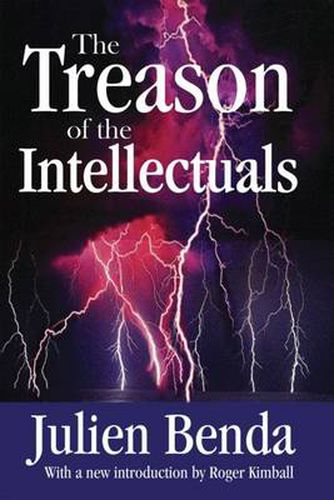Readings Newsletter
Become a Readings Member to make your shopping experience even easier.
Sign in or sign up for free!
You’re not far away from qualifying for FREE standard shipping within Australia
You’ve qualified for FREE standard shipping within Australia
The cart is loading…






Julien Benda’s classic study of the European 1920s resonates today. La trahison des clercs is one of those phrases that bristle with hints and associations without stating anything definite. In his new introduction, Roger Kimball quotes from a contemporary, Alain Finkielkraut, who recalls in haunting words the essence of The Treason of the Intellectuals . When hatred of culture becomes itself a part of culture, the life of the mind loses all meaning. As Kimball reminds us, in the present age, only the title of the book, not its argument, enjoys currency. The book itself is well known without being known well. Its release at this time should overcome that neglect. The treason of which Benda writes was the betrayal by the intellectuals of their unique vocation. From the time of the pre-Socratics, intellectuals, in their role as intellectuals, had been a breed apart. In Benda’s terms, they were understood to be all those whose activity essentially is not the pursuit of practical aims, all those who seek their joy in the practice of an art or a science or a metaphysical speculation, in short in the possession of non-material advantages.
Thanks to such men, Benda noted, humanity did evil for two thousand years, but honored good. This contradiction was an honor to the human species, and formed the rift whereby civilization slipped into the world. According to Benda, this situation began to change in the early decades of the twentieth century. More and more, intellectuals abandoned their attachment to the traditional panoply of philosophical and scholarly ideals. One clear indication of the change was the attack on the Enlightenment ideal of universal humanity and the concomitant glorification of various particularisms. The implications for intellectual life today are transparent, and this long unavailable classic of European thought should interest all those who teach and who preach the human sciences.
$9.00 standard shipping within Australia
FREE standard shipping within Australia for orders over $100.00
Express & International shipping calculated at checkout
Julien Benda’s classic study of the European 1920s resonates today. La trahison des clercs is one of those phrases that bristle with hints and associations without stating anything definite. In his new introduction, Roger Kimball quotes from a contemporary, Alain Finkielkraut, who recalls in haunting words the essence of The Treason of the Intellectuals . When hatred of culture becomes itself a part of culture, the life of the mind loses all meaning. As Kimball reminds us, in the present age, only the title of the book, not its argument, enjoys currency. The book itself is well known without being known well. Its release at this time should overcome that neglect. The treason of which Benda writes was the betrayal by the intellectuals of their unique vocation. From the time of the pre-Socratics, intellectuals, in their role as intellectuals, had been a breed apart. In Benda’s terms, they were understood to be all those whose activity essentially is not the pursuit of practical aims, all those who seek their joy in the practice of an art or a science or a metaphysical speculation, in short in the possession of non-material advantages.
Thanks to such men, Benda noted, humanity did evil for two thousand years, but honored good. This contradiction was an honor to the human species, and formed the rift whereby civilization slipped into the world. According to Benda, this situation began to change in the early decades of the twentieth century. More and more, intellectuals abandoned their attachment to the traditional panoply of philosophical and scholarly ideals. One clear indication of the change was the attack on the Enlightenment ideal of universal humanity and the concomitant glorification of various particularisms. The implications for intellectual life today are transparent, and this long unavailable classic of European thought should interest all those who teach and who preach the human sciences.